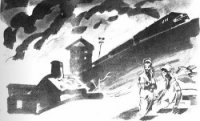Operation Nemesis: The Assassination Plot that Avenged the Armenian Genocide - Bogosian Eric (читать книги полностью без сокращений txt) 📗
The Armenian revolutionaries particularly sought the attention of Western leaders. If Europeans could only see how barbaric the Turks were, they might pressure the sultan to ease off on violence aimed at the Armenian peasantry. More than that, external pressure might secure constitutional rights for Ottoman minorities, giving them some relief. The millet system was no longer functional in this modern world. Some Armenians benefited from the new economies and trade with the West, but most were finding life in the eastern parts of the Ottoman Empire barely sustainable.
In the West in the 1890s, every well-read person was familiar with the atrocities committed by the “Bloody Turk” and the “Red Sultan.” Every newspaper and monthly magazine featured lurid stories of Muslim violence. The New York Times published dozens of accounts. One reported: “A witness hiding in the oak scrub saw soldiers gouge out the eyes of two priests, who in horrible agony implored their tormentors to kill them. But the soldiers compelled them to dance while screaming with pain, presently bayoneted them.”9 Committees were formed by indignant Americans and British insisting that the horrific violence cease immediately. European powers demanded that Abdul Hamid “protect” the indigenous Christian populations living as subjects within the borders of his empire. And if the sultan refused to behave as the West wished, the West would force him to behave. The sultan, and Ottoman Turks in general, were developing a very bad rep. As early as 1876, British prime minister William Gladstone summed up the West’s opinion of “the Turk”:
Let me endeavor very briefly to sketch, in the rudest outline, what the Turkish race was and what it is. It is not a question of Mahometanism simply, but of Mahometanism compounded with the peculiar character of a race. They are not the mild Mahometans of India, nor the chivalrous Saladins of Syria, nor the cultured Moors of Spain. They were, upon the whole, from the black day when they first entered Europe, the one great anti-human specimen of humanity. Wherever they went, a broad line of blood marked the track behind them; and, as far as their dominion reached, civilisation disappeared from view.10
Despite their disdain for the barbarism of the East, Europe and the United States had already written their own bloody histories as overlords of their respective colonies. Utilizing the latest Maxim machine guns and unstoppable “gunboat diplomacy,” by the 1800s the major European powers and the upstart United States had used violence to found settlements all over the world. In East Africa (Kenya), the British had forced local Africans onto reservations and turned the natives into a peasant labor force serving the white settlers. When the locals resisted, they were murdered. The peoples of Central and South America had long ago been decimated by Spanish and Portuguese conquistadors. Belgium’s King Leopold presided over stunning atrocities as he ran his own personal fiefdom in the Congo. Germany had intentionally destroyed the Herero people of South-West Africa (Namibia). General Lothar von Trotha, who oversaw these massacres, was unequivocal: “It was and remains my policy to apply force by unmitigated terrorism and even cruelty. I shall destroy the rebellious tribes by shedding rivers of blood.”11 British coercion in India (labeled “administrative massacre” by one observer in 1924)12 and China, the American war against the native people of its frontier lands and its scorched-earth campaign in the Philippines, and the French subjugation of North Africa were all oppressive policies that reached their height during this period.
When the West overpowered native populations, these actions, no matter how violent, were rationalized as manifestations of the natural order of things. “Manifest destiny” and “social Darwinism” laid the foundation for violent improvement of the world. Europeans saw themselves as superior and naturally born to rule. They believed that their domination of faraway lands brought “civilization” to the natives. In return, the rulers of the empires benefited. “The purpose of colonies was to supply the mother country with raw materials and to provide a market for her manufactured goods, all on an exclusive basis.”13 As late as 1943, British home secretary Herbert Morrison, when commenting on the subject of granting African colonies their independence, would be quoted as saying, “It would be like giving a child of ten a latch-key, a bank account, and a shot-gun.”14
Empires were gradually giving way to a new paradigm, the “nation,” an idea that a “people” have a shared history, language, and culture that form the bedrock of a “nationality.” As the nineteenth century ended, Europe, and eventually the whole world, became enamored with nationalism. A nation was not a tangible thing; it was an abstract idea, and as such it could be defined to serve different needs. Great Powers like Britain and France included their far-flung colonies in their definition of nation. In theory, the idea of a nation seemed to be an immutable truth, but it was actually a complex ideological fantasy. National “purity,” a romantic notion attractive to many, rarely existed in the real world. It would nevertheless be only a matter of time before the idea of “nation” served as a catalyst to war. Nationalism, ethnic cleansing, and genocide are related: they all share mythic notions of a pure and common origin, and they all serve material ambitions.
For the subject peoples of aging empires, “nationhood” became a call to arms, especially with regard to the Ottoman Empire. Egged on by Great Powers like Russia and Great Britain, smaller populations like the Serbs, the Greeks, the Arabs, and the Armenians also began to think of themselves as “nations.” Inspired by that idea, they attempted to break away. Some succeeded; others did not. In the case of the clash between Armenians and the Ottoman Empire, nationalism would have tragic consequences.
The Imperial Bank Ottoman in Constantinople served as a “de facto central bank,”15 so in the eyes of the ARF, it symbolized European economic interests in the Ottoman Empire. Twenty years earlier, the empire had officially gone bankrupt because of lavish spending by Abdul Hamid’s predecessors, who were intent on building sumptuous palaces for themselves and their kin while pursuing a debauched lifestyle. That extravagance came to an end when the Ottoman Public Debt Administration was established in 1881. European bankers stepped in and assumed Turkey’s debt in exchange for control over how public monies were collected and spent by the Sublime Porte. Britain joined France in picking up a good chunk of the debt. By controlling the economy, the European bankers took over firm control of the state.
The Ottoman Empire had become an economic colony of the West. By World War I, Britain, France, and Germany would own or manage not only the empire’s finances but most of its infrastructure and resources as well. Either directly or indirectly, the Great Powers had rights over railroads, shipping, mining, tobacco, cotton, municipal water and lighting, banking, and mineral licenses, including the newly important petroleum reserves. In addition, the Europeans were essentially unregulated when doing business within the jurisdiction of the sultan, because over the centuries they had established a parallel legal system within the empire, especially with regard to business. These “capitulations” were a series of treaties allowing subjects of certain foreign governments to evade harsh Sharia-based law. In the Ottoman Empire, Europeans and Americans had their own courts and their own post offices. In addition, France, Britain, and Germany shipped in numerous military advisors, an easy way to keep a close eye on the Ottoman military.




